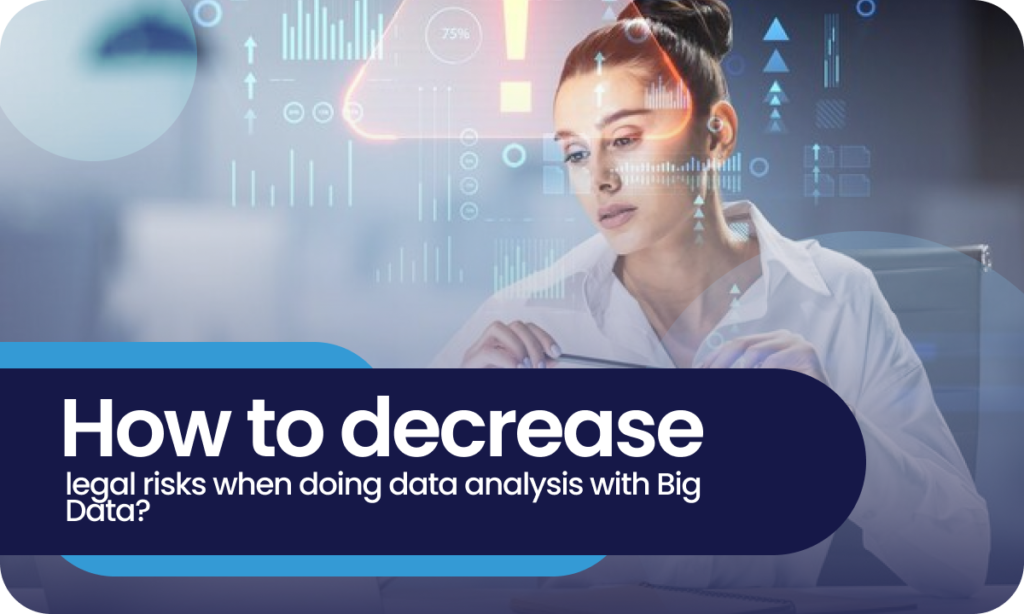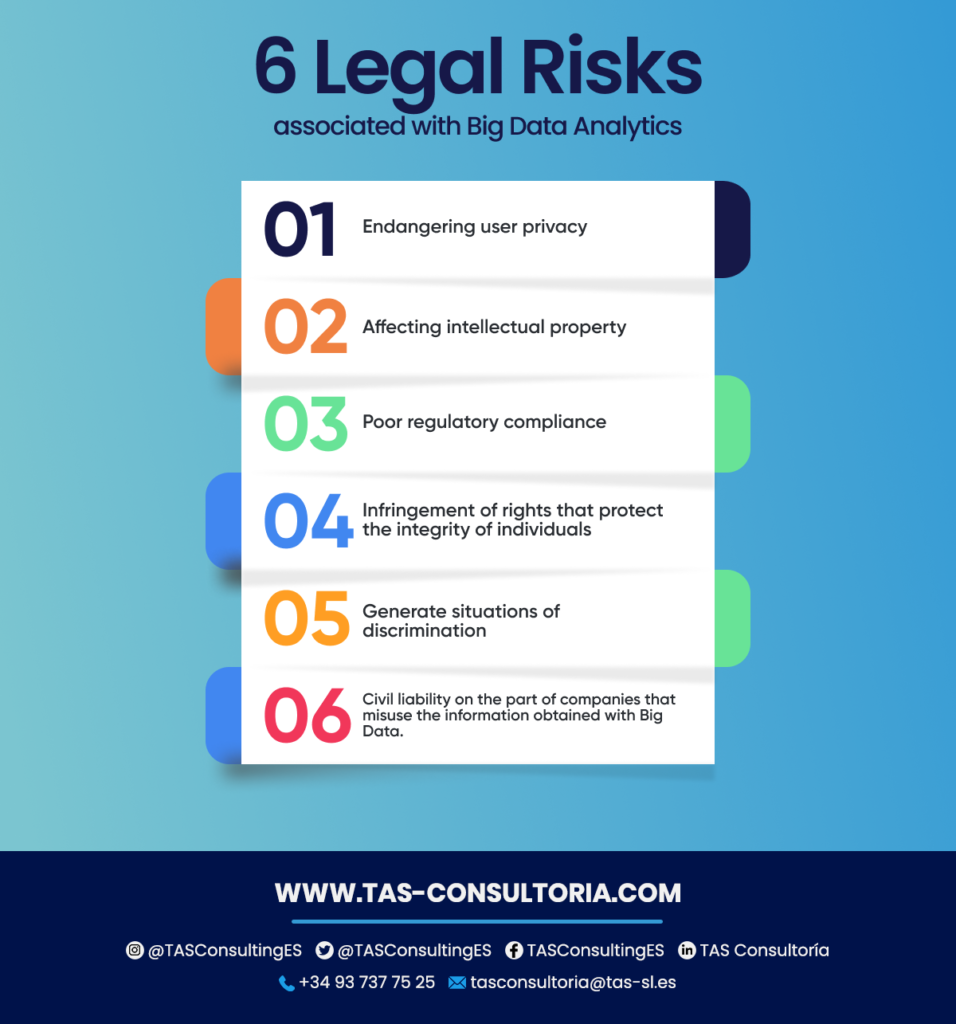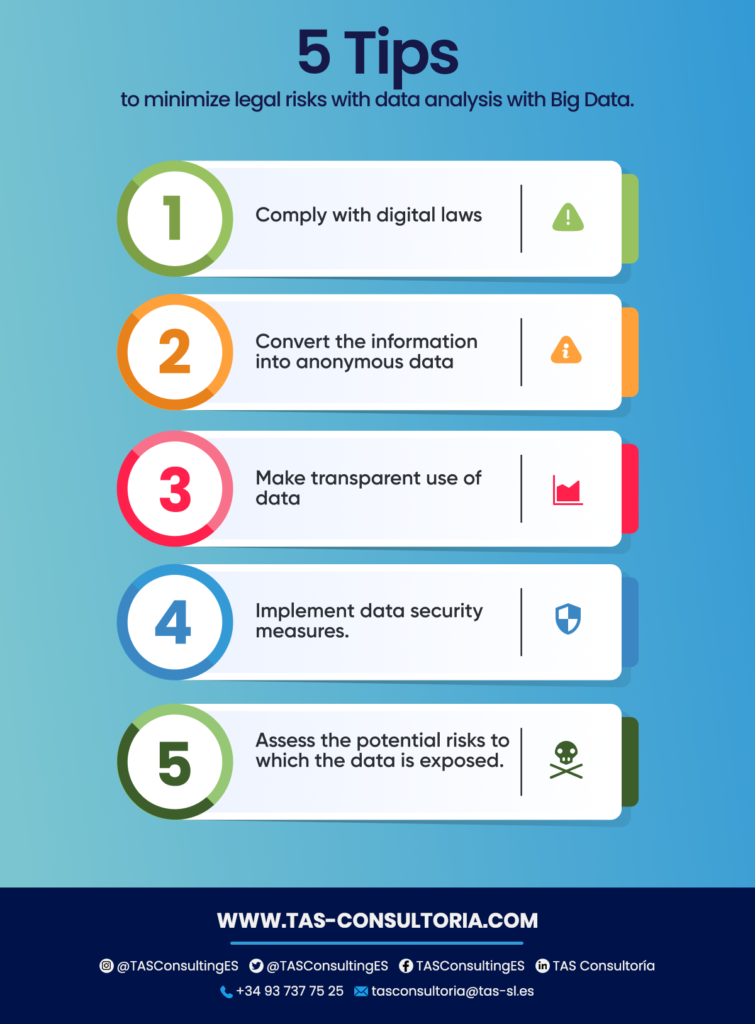
Every day, more and more companies are extracting information to analyze data and thus predict the behavior of their customers, and meet their needs. Much of this data comes from the Internet or the cloud, which gives relevance to the treatment given to this information and whether it complies with legal standards. Do you want to know how it is possible to reduce the legal risks of data analysis with Big Data? Stay until the end!
What is data analysis with Big Data?
Data analysis with Big Data consists of processing and analyzing large amounts of data. These can come from various sources: RRSS, online transactions, sensors, mobile devices, etc.
The big data analysis process is complex and requires different methods. Among them, predictive analytics, Machine Learning, Streaming Analytics and various techniques such as database analysis and cluster analysis.
The objective of data analysis with big data is none other than to obtain valuable and useful information. Information that allows companies and organizations to make appropriate and strategic decisions.
You may also be interested in: What is a patent and how to obtain it in Spain?
Why is it crucial to minimize the legal risks of data analysis with Big Data?
In Spain, data analysis has become an increasingly essential practice in different sectors. These include finance, healthcare, telecommunications, energy and many more.
In this sense, companies and organizations make use of Big Data tools and technologies such as Hadoop, Spark and NoSQL. They will allow processing large amounts of data and thus obtain relevant information. For example, behavioral patterns, financial risk analysis, social network and supply chain analysis, etc.
In Spain there are several research centers and universities dedicated to Big Data projects. Among them are the Polytechnic University of Madrid, the University of Barcelona, the University of Valencia, among others.
6 legal risks of Big Data analysis in Spain that you should know about
There are legal risks of data analysis that must be avoided at all costs. To this end, it is recommended to perform a risk analysis to ensure regulatory compliance and avoid potential financial and reputational sanctions.
Want to know more? Below, we’ll tell you about some of the main legal risks of data analytics associated with Big Data:

User privacy
The Organic Law on the Protection of Personal Data and Guarantee of Digital Rights (LOPD-GDD) and the General Data Protection Regulation (GDPR) of the European Union establish the legal obligations applicable to the processing of personal data.
It expresses the imperative need to comply with transparency obligations. And not only that, but also of information, consent and security of personal data.
Intellectual Property
The use of data and content that may be protected by intellectual property rights may apply. For example, copyrights or patents. Therefore, it will be necessary to have the necessary authorizations to handle such data and contents.
Regulatory compliance
In addition to data protection and intellectual property laws, there are regulations that must be considered. This will limit the legal risks of data analysis as much as possible.
Some of these regulations are telecommunications, advertising and consumer protection regulations.
Infringement of rights
Data analysis interferes with the right of individuals to protect their content and regulate its use. But, in addition to interfering with data protection regulations, it also infringes the law on the right to honor and image.
Likewise, these rights are also protected by other regulations capable of adhering to the LOPD-GDD.
Discrimination
There may be discriminatory situations, such as exclusion of certain groups or decision-making based on characteristics protected by law. For example, race, gender or sexual orientation.
This aspect distances data analysis with big data from compliance with its anti-discrimination legislation. This significantly exposes companies to the legal risks of data analysis.
Liability
Companies that analyze data with Big Data may be civilly liable for damages caused to third parties as a result of their activity.
Therefore, data analysis with big data in Spain can lead to significant legal risks. This is the case if appropriate measures are not taken to ensure legal compliance to avoid economic and reputational sanctions.
You may also be interested in: Nationality agreement between Spain and France
5 tips to minimize the legal risks of data analysis with Big Data
If not done correctly, there may be legal risks of data analysis with Big Data. Below, we will give you some recommendations that will help you reduce these risks:

Complying with digital laws
As we told you, it is important that you comply with the laws and regulations for data processing. To do so, appropriate policies and procedures must be implemented. This will ensure the protection of personal data and the privacy of individuals.
Data anonymization
Anonymization of data can significantly reduce the risk of a privacy breach. By removing personal identification from the data, the possibility of being able to identify a specific individual is reduced.
Transparency
It is necessary to make transparent use of people’s information and to notify them about its use. This can be achieved through the publication of a clear and easy to understand privacy policy. From it, individuals can consent to the use of their data.
Data security
It is necessary to implement adequate security measures for data protection. But protect them from what? Well, from unauthorized access and the loss, alteration or destruction of information.
These measures would include data encryption and the implementation of access controls.
Risk assessment
It is advisable to conduct a risk assessment in order to identify the potential dangers of data processing. In this way, the necessary measures can be implemented to mitigate the legal risks of data analysis.
Data analytics with Big Data can be beneficial for companies and organizations. But it can also entail legal risks if the right measures are not taken. Therefore, it is necessary to take into account these suggestions so that you can manipulate your customers’ data without exposing yourself to legal problems.
You may also be interested in: From the MOSS regime to the OSS regime: what is it all about?
It is important, for the health of your company, to know in depth each of the legal aspects that are handled in Spain. The correct handling of your clients’ data is the key to avoid the legal risks of data analysis with Big Data. The best recommendation we can give you, in that sense, is to put you in touch with our professional advisors.
Contact us through our email tasconsultoria@tas-sl.es and schedule your free consultation. We can provide you with legal, tax and accounting support for your company, this is your opportunity to move forward with your organization into the future!




Your email address will not be published .
Required fields are marked with *